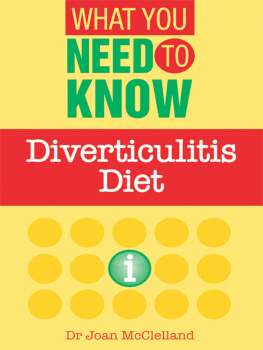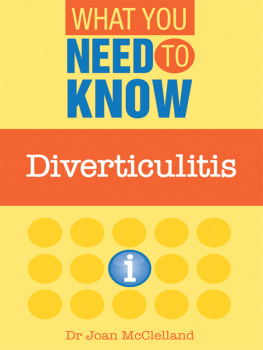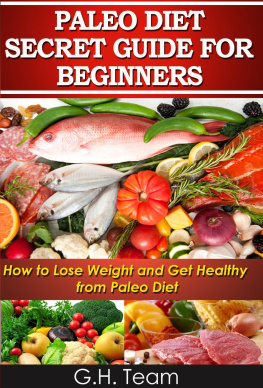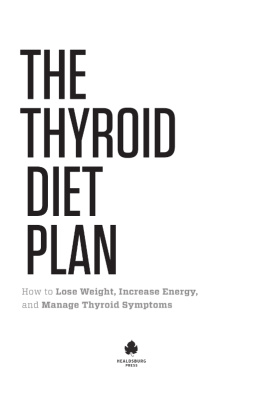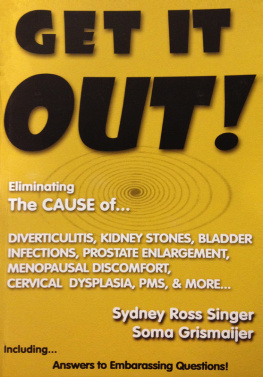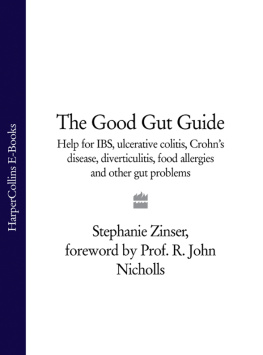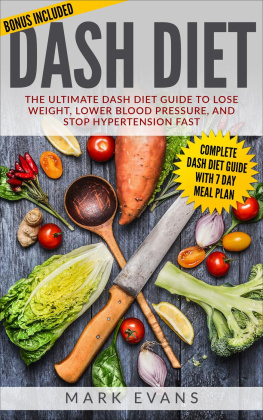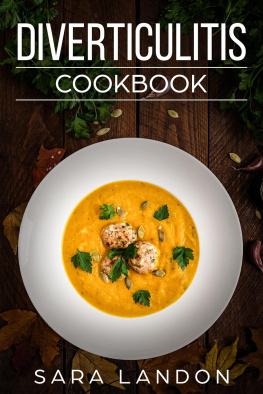Dr Joan McClelland studied medicine in Glasgow, Birmingham and London. For several years she worked with her husband in General Practice before specialising in psychiatry. She was elected a Fellow of the Royal College of Psychiatrists in 1982 and obtained diplomas in the history and philosophy of medicine in 1996 and 1998 respectively. Her particular interest is the interface between physical and psychological illness. Joan is now a full time author and lives near Churt, Surrey.
Introduction
If you are a Westerner that is, you live in North America, Western Europe, Australia or New Zealand and you are aged 50 or more, you are in the high-risk group for diverticular disorder. You had a 30 per cent likelihood at age 45, 40 per cent at 50 and 50 per cent plus when you hit 70. There are smaller areas of Western-type lifestyle, the likely sort for diverticulitis, among Jewish people all over the world, in modern Japan, and other sophisticated Asian countries like Singapore. It is a matter of soft living and a soft diet.
The behaviour that leads to diverticular disorder is lack of exercise involving the abdominal muscles that normally keep your figure in trim, and the automatic muscles of the colon, the lower part of the digestive passage itself. Without stimulus this becomes slack and baggy, with little pockets of food waste, the diverticula, bulging out from it. A minimum of three of these qualifies for a diagnosis of diverticulosis. Infection in one or more little pouches is called diverticulitis.
Diverticulosis and diverticulitis are the two forms of diverticular disorder. The former does not cause anything worse than discomfort, but diverticulitis is sharply painful and is often called left-sided appendicitis. The appendix is a blind alley, in fact a special diverticulum on the right side of the abdomen, and it is prone to stagnation of its contents and the development of infection. Adolescents and young adults are particularly susceptible to appendicitis, while the middle-aged and elderly more often get diverticulosis that develops into diverticulitis.
For a detailed description and explanation of diverticular disease, see my book How to Cope Successfully with Diverticulitis, Wellhouse Publishing, Farnham, UK, 2001.
The habits that make you vulnerable to diverticular disorder also lead to hiatus hernia at an age when the muscles of the digestive system are, like others, all becoming weaker and constipation is often beginning to be a problem. Increasing efforts are required to pass a motion.
Constipation, the sluggish movement of food waste along the intestine, is frequently the first indication of diverticular disease and may be accompanied by hiatus hernia. It is enhanced by:
- faulty diet: too little fibre; too much fattening food with too little bulk, e.g. chocolate
- dehydration, from inadequate fluid intake (common in older people)
- rushed modern lifestyle with insufficient patience to give the gut time to act
- reduced mobility, often because of arthritis: ordinary muscular exercise stimulates the intestines
- frequent travel, as in commuting, which may make it difficult to get to the loo
- some medicines, for instance pain-killers, antidepressants or iron pills
- illnesses such as hypothyroidism or diabetes
- sex: women are affected three times as often as men, i.e. less muscle work
- increasing age with weaker muscles.
The snags of modern living that underlie the current epidemic of obesity also impede the activity of the colon:
- being a couch potato watching television
- being a mouse potato the only exercise is clicking with the right index finger!
- supermarket shopping everything under one roof
- ready-made meals extra sweet and palatable
- less smoking reduces appetite (but not to be recommended!)
- cars even for the shortest journey
- labour-saving tools washing machines, vacuum cleaners etc.
Symptoms of constipation are:
- bloating, discomfort
- backache, headache
- nausea
- passing a motion fewer than three times a week
- straining to pass a motion on at least 25 per cent of occasions
- haemorrhoids.
How to Avoid Diverticular Disorder, Especially Diverticulitis, or to Lessen its Effects
There are two main ploys: exercise and, most importantly, diet.
Exercise
This is simple, consisting of practising the use of the muscles of the abdomen, both internal and external. The external muscles are those that surround and support the abdomen, rather like a corset. They are exercised by alternately drawing them in, holding for a count of ten, then relaxing them, and lying on your back and sitting up or raising your legs. Standing up with straight legs and touching your toes. Repeat each of these exercises ten times. Ten times. General bodily exercise also tones up these muscles; for instance, walking briskly for 30 minutes daily or 40 minutes three times a week.
Internal exercises use the muscles of the intestines themselves. You cannot tighten them voluntarily, but they can be stimulated by a diet that contains adequate amounts of fibre, giving them something solid to grip. This is the opposite of their slow, sluggish action in constipation. Fruit, especially citrus, and vegetables, especially the green, yellow and leafy types, provide a generous supply of fibre as well as vitamin C and antioxidants. Oats in particular and other wholegrain cereals are good sources of fibre.
Diet is the major key to beating diverticulitis and is the main subject of this book.
General Dietary Requirements
General dietary requirements apply to everyone, whether or not you are focusing on diverticular problems. You need to have some of each of the three basic types of food:
- carbohydrates: fillers and the main suppliers of energy, they include bread, rice, cereals, pasta and potatoes
- proteins: necessary for growth and repair, these include foods derived from animal sources such as meat, fish, eggs and dairy produce, and vegetable products such as nuts and beans.
- fats: these provide concentrated nourishment, supplying more than twice as many calories as equivalent weights of protein or carbohydrate; they make other foods more palatable but easily lead to obesity
- fibre: this gives bulk to the diet.
Your daily intake of these various classes of food should be roughly divided as:

